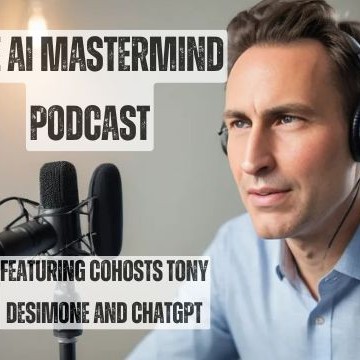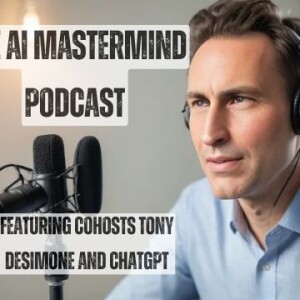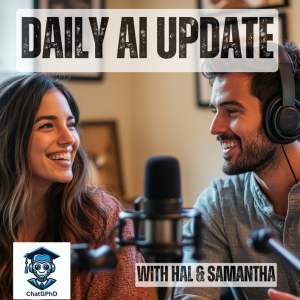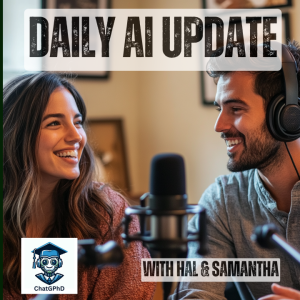

30.8K
Downloads
142
Episodes
Introducing the first AI podcast where a human and an AI assistant co-host to discuss the latest advancements in artificial intelligence.
Introducing the first AI podcast where a human and an AI assistant co-host to discuss the latest advancements in artificial intelligence.
Episodes

Wednesday Oct 23, 2024
When AI Becomes a Predator: A Teen's Tragic Suicide and the Character.AI Lawsuit
Wednesday Oct 23, 2024
Wednesday Oct 23, 2024
A Florida mother, Megan Garcia, has filed a lawsuit against Character.AI following the tragic suicide of her 14-year-old son, Sewell, who became deeply involved with the platform's AI chatbot. The lawsuit alleges that Character.AI acted recklessly by providing minors access to realistic AI companions without adequate protections, collecting data from young users, employing addictive design features, and guiding users toward inappropriate content. This case raises significant questions about the responsibilities of tech companies in safeguarding vulnerable users, particularly minors, and could set a precedent for holding AI platforms accountable for their impact on mental health. As society grapples with the implications of AI technology, this incident underscores the urgent need for robust regulations and ethical guidelines.

Wednesday Oct 23, 2024
Anthropic Breaks New Ground with Claude AI Upgrades and Human-Like Computer Control
Wednesday Oct 23, 2024
Wednesday Oct 23, 2024
Anthropic has unveiled two major updates to its Claude AI lineup: the upgraded Claude 3.5 Sonnet and the new Claude 3.5 Haiku, both designed to enhance AI performance and accessibility. Claude 3.5 Sonnet delivers significant coding improvements, outperforming other models on key benchmarks and providing advanced capabilities for both creative and technical tasks. Meanwhile, Claude 3.5 Haiku matches the high performance of previous models but at a lower cost, making advanced AI more accessible. The most exciting news is the introduction of a public beta feature called "computer use," which allows Claude to interact with computers like a human—typing, clicking, and navigating across multiple apps. Though still experimental, this feature marks a big step toward seamless AI-driven automation, with early adopters like Asana, Canva, and Replit already leveraging its potential.

Tuesday Oct 22, 2024
Tuesday Oct 22, 2024
In a surprising turn of events, Alcon Entertainment, the production company behind "Blade Runner 2049," has filed a lawsuit against Tesla, CEO Elon Musk, and Warner Bros. Discovery. The legal action stems from Tesla's Robotaxi unveiling event on October 10, 2024, where Musk allegedly used AI-generated imagery resembling scenes from the iconic sci-fi film without permission. Despite Alcon's prior refusal to grant usage rights, Tesla proceeded with visuals that closely mirrored key moments from the movie, including a man overlooking a desolate cityscape. The lawsuit accuses the defendants of copyright infringement and false endorsement, highlighting concerns about potential damage to Alcon's brand and future partnerships. This case raises important questions about the intersection of AI, copyright law, and the responsibilities of high-profile tech figures in respecting intellectual property rights.

Tuesday Oct 22, 2024
Tuesday Oct 22, 2024
UCLA researchers have developed a groundbreaking deep-learning framework called SLIViT (SLice Integration by Vision Transformer) that can automatically analyze and diagnose 3D medical images with accuracy matching that of medical specialists, but in a fraction of the time. Unlike other models, SLIViT has wide adaptability across various imaging modalities, including 3D retinal scans, ultrasound videos, 3D MRI scans, and 3D CT scans. The system overcomes the challenge of limited training datasets by leveraging prior medical knowledge from the 2D domain, allowing it to perform effectively with moderately sized labeled datasets. SLIViT's automated annotation capability has the potential to improve diagnostic efficiency, reduce data acquisition costs, and accelerate medical research. The researchers plan to expand their studies to include additional treatment modalities and explore the model's potential for predictive disease forecasting to enhance early diagnosis and treatment planning.

Monday Oct 21, 2024
Leaked Report - OpenAI's Shocking Revenue Projections Revealed!
Monday Oct 21, 2024
Monday Oct 21, 2024
In this episode, we discuss OpenAI's revenue projections and what they reveal about the company's strategic direction. ChatGPT remains the key revenue driver, with continued investment in its growth. OpenAI anticipates modest API growth but expects a big boost from new products launching in 2025, including AI-powered search engines, video tools, and AI agents. These agents could mark a major leap in AI capabilities. However, OpenAI is navigating challenges like ethical concerns, regulatory scrutiny, and competition. The takeaway? OpenAI sees the future of AI in consumer products, autonomous agents, and diverse AI solutions.

Sunday Oct 20, 2024
Anthropic makes moves to avoid SkyNet
Sunday Oct 20, 2024
Sunday Oct 20, 2024
Anthropic, an artificial intelligence research company, has updated its Responsible Scaling Policy (RSP) to address the risks posed by increasingly powerful AI models. The RSP lays out a framework for ensuring that AI models are developed and deployed responsibly, with safeguards in place to prevent catastrophic harm. The company's approach is based on a tiered system of safety levels (ASLs), with higher levels requiring more stringent safeguards for models with greater capabilities. The RSP also introduces the concept of Capability Thresholds, specific levels of AI capability that trigger the implementation of increased safeguards. The policy includes detailed procedures for assessing model capabilities, implementing appropriate safeguards, and ensuring transparency and accountability in the development and deployment of AI systems.

Thursday Oct 17, 2024
The AI Energy Conundrum
Thursday Oct 17, 2024
Thursday Oct 17, 2024
Tech giants like Amazon, Google, and Microsoft are investing heavily in nuclear power to meet the surging energy demands of their data centers and artificial intelligence operations. These companies are prioritizing small modular reactors (SMRs) as a clean, reliable, and scalable energy source to achieve their carbon reduction goals. While this shift towards nuclear power offers a promising solution to the tech industry's energy challenges, it also faces hurdles such as regulatory complexities, public perception, and the need to address nuclear waste management.

Wednesday Oct 16, 2024
Why everyone is leaving OpenAI and Sam Altman
Wednesday Oct 16, 2024
Wednesday Oct 16, 2024
In this episode, we explore the significant changes at OpenAI, diving into the major shifts and transformations that have reshaped the company's direction. We discuss the factors behind the exodus of talent, the future trajectory of AI research, and how these internal changes could impact the broader tech ecosystem. Tune in to understand what’s happening behind the scenes and what it means for AI's future.

Tuesday Oct 15, 2024
Privacy Nightmare: Harvard Students Expose Dangers of Meta's Smart Glasses
Tuesday Oct 15, 2024
Tuesday Oct 15, 2024
In this episode, we explore a groundbreaking proof-of-concept system created by two Harvard students that transforms Meta's Ray-Ban smart glasses into a powerful surveillance tool, raising alarming concerns about privacy in the digital age. The system, named I-XRAY, combines facial recognition, large language models, and public databases to identify strangers and retrieve personal information in real-time.
Listeners will learn how the I-XRAY system operates, using smart glasses to discreetly capture live video, which is then processed to recognize faces, conduct reverse image searches, and pull personal details like home addresses and phone numbers. Through demonstrations, the students were able to gather sensitive data on individuals in public, revealing the chilling potential for misuse in identity theft, stalking, or worse.
We also delve into the broader implications for privacy and AI as this project illustrates how easily accessible technologies can be turned into invasive tools. The episode wraps up by discussing mitigation strategies, the ethical considerations of such technologies, and the urgent need for stronger privacy regulations in an AI-driven world.
Key topics covered:
- How the I-XRAY system works
- Real-life demonstrations of privacy invasion
- The potential for AI and surveillance misuse
- The need for stronger privacy protections in the age of AI
Join us as we navigate the evolving landscape of privacy and technology, and discuss how to safeguard personal information in an increasingly connected world.

Monday Oct 14, 2024
Monday Oct 14, 2024
In this week’s episode, we explore a thought-provoking essay by Dario Amodei, CEO of Anthropic, who shares his optimistic vision of how AI could radically transform the world for the better. Amodei discusses AI’s potential to revolutionize sectors like biology, healthcare, mental health, and economic development by accelerating research and problem-solving on a massive scale. He highlights AI’s ability to potentially cure diseases, double the human lifespan, and eliminate poverty. However, Amodei also emphasizes the need for cautious development to navigate risks, particularly in governance and the future of work, advocating for the importance of AI safety and regulation to ensure these transformative outcomes. Join us as we unpack Amodei’s predictions and their implications for the future.